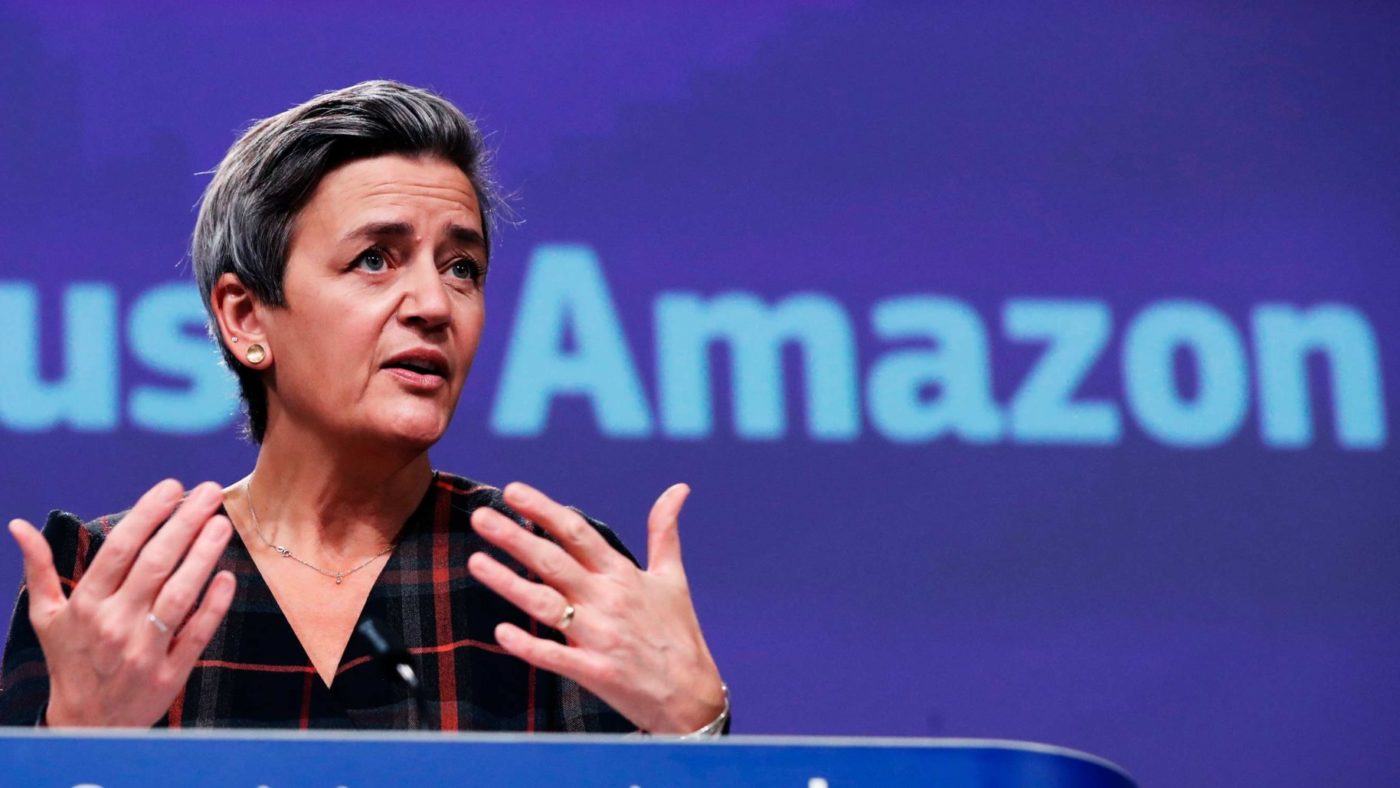The European Commission is currently locked in a high-stakes game of Big Tech Bingo. The challenge is simple: bring competition proceedings against all of Silicon Valley’s “tech giants” (Google has been repeatedly chastised by the Commission, while Apple and Facebook are currently being investigated). On Tuesday, the Commission moved one step closer to winning this dubious game by lodging a formal complaint against Amazon.
Unfortunately, it is hard to shake the feeling that the Commission is trying to score political points at the expense of European consumers.
The gist of the Commission’s case is that Amazon enjoys a dominant position in the market “for marketplace services”. According to the Commission, this enables it to harm third-party sellers that use its platform by (i) using data generated from the platform to make strategic decisions (such as what Amazon-branded goods to launch), and (ii) placing Amazon-branded goods more favourably. It also, allegedly, favours third-party sellers that choose its own storage and delivery services (this is referred to as “fulfilment” in the industry), rather than their own.
But even if it did enjoy a quasi-monopoly — something that is far from certain — Amazon has little incentive to engage in a strategy of this sort unless it ultimately produces lower prices for consumers.
Systematically excluding third-party sellers, or behaving in a way that made it unviable for them to use Amazon, would be suicidal. As its latest annual report shows, these sellers are one of Amazon’s biggest sources of revenue growth. Systematically expropriating these firms (by entering the segments where they operate and copying their goods) would deprive them of revenue and deter them from joining Amazon in the first place.
This is not to say that Amazon will never compete head-on against these sellers, but rather that any such action needs to remain highly targeted to avoid deterring others from joining. Amazon needs to balance its competition with third-party sellers against the need to attract them to its marketplace in the first place. The upshot is that whatever motives underlie Amazon’s behaviour, they are far more nuanced than a naked attempt to exclude third-party sellers.
So why might Amazon behave this way? Two answers spring to mind and both of them suggest that Amazon’s behavior is highly beneficial to consumers.
A first explanation is that, like virtually all retailers, Amazon wants to offer private label goods. Private labels leverage a retailer’s reputation to compete against leading brands, and this generally leads to lower prices for consumers.
The Commission says that Amazon is free to do this, so long as it does not base these decisions on data gleaned from third-party sellers, and does not display its own goods more favourably. But such an assertion hinges on a misguided sense of fairness.
Why should Amazon be prevented from using the best possible information to make private label decisions? For one thing, better and more visible private labels mean more competition and lower prices. This may be unpleasant for competitors, but it is not usually considered to be something that a competition authority should try to prevent.
There is also a more technical explanation for Amazon’s behavior. With the exception of some digital content, the company does not produce any goods – it merely badges products made by others. So when it offers a private label good, or when it chooses a product that will be displayed as default in the buy-box, Amazon is not substituting itself for rivals. Instead, it is changing the nature of competition between these firms.
Economists have shown that this type of exclusivity (exclusivity over a set of incremental sales, to be precise) intensifies competition for distribution. Producers will compete harder to become Amazon’s private label; retailers will further lower their prices to become the default purchase choice; etc. All of this benefits consumers.
The Commission offers a questionable rebuttal in the form of its second allegation against Amazon – that the effect of these decisions is to favour Amazon’s own storage and delivery services. For example, private label goods are stored in Amazon’s warehouses, and third- party goods are more likely to become Amazon’s default choice if the seller opts for fulfilment by Amazon.
But there is no rational motive for this type of self-preference. Storage and distribution are a cost to Amazon (packaging, storing and shipping items costs money). If a third party can do this better or more cheaply, then Amazon would be foolish to stop them. Not only does Amazon earn a percentage of the increased sales (other things being equal, lower shipping fees will boost sales), but Amazon could also respond by increasing its platform fees.
The more likely explanation is simply that rival fulfilment services are either slower and/or less reliable than Amazon’s. In other words, the lower cost that these services provide might not be worth it for consumers, and Amazon thus places them less favourably. Amazon’s fulfilment, for example, makes returns very easy — returns are usually free of charge and done with a QR code instead of the customer having to print a label out, and Amazon usually refunds the customer as soon as the package is dispatched. It is not difficult to imagine that consumers may prefer this, so giving preference to companies that use this service is a response to this consumer demand.
Given these explanations, all that remains is an argument that Amazon — by virtue of its size, innovation and efficiency — enjoys an unfair advantage over its rivals. Not only does this definition of ‘unfair’ stretch credibility, but there is precious little evidence that it harms consumers. Indeed, it is the very definition of the free market competition values that the European treaties sought to promote.
Click here to subscribe to our daily briefing – the best pieces from CapX and across the web.
CapX depends on the generosity of its readers. If you value what we do, please consider making a donation.


